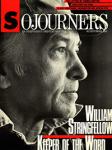Mine is a very personal approach to understanding William Stringfellow's witness to the church in our day. The encounters he and I had over the last six years were important to both of us, I believe. He was involved in my own struggles as an elderly woman seeking ordination, and my difficulties pointed up for both of us the multifarious facets of both sexism and ageism. We also met over a variety of concerns having to do with justice and peace, and we shared a lively sense of irony and creative absurdity that brightened the times of relaxation among friends.
Among the good memories is his inconspicuous entry into a seminar room in which he was to speak. Not having what you would call a commanding physical presence, Bill would simply take his place and look at his notes and the audience until it fell into a silence to match his own. Those who knew him would become still at once, knowing that his words would at times become almost inaudible.
But even without speech, Bill compelled attention. His eyes were arresting in their power, for they searched out the faces before him and drew his hearers in. I puzzled over the emphatic response he drew from others as well as myself, for he seldom raised his voice and was sparing of gesture. But there was lightning in his eye and thunder in his voice when on the rare occasion he let loose to emphasize what he was saying.
A bell rang inside me when I found a statement in one of Bill's books: "I am the most passionate person I know." Why, of course he is, I thought. He doesn't have to overdo it; it is just there for him. He reaches out from the solitary spaces in his heart and touches all of us in our own solitude. If there are any dry bones among us, they are then knit together, and now they stand up, and they live.
Bill had the rare grace of being fully present to the person to whom he was talking. Many of us remember in him both a friend and a champion in addition to his authentic and prophetic voice. For me he was an inspiring presence along a personal trail of tears that I often despaired would never reach its end in ordination.
A particularly defeating moment came when I was turned down for the fifth time by a church committee I had to pass for ordination. Bill was present when I got the news. He took me aside privately, fixed his steady gaze on me, and said, "If you are willing to take your diocese into civil court, I think this would give us the best case so far for the church's discrimination against women."
The statement was typical of Bill's passion for justice; typical too were his modesty and courtesy in not stressing his own qualifications as defender and in leaving me to settle my own actions without any persuasion on his part. As we talked I realized that a decision such as I now faced had to be emphatically my own. I went away privately to wrestle with it and elected not to spend the last years of my life in and out of courtrooms. He never referred to the episode or questioned my decision. In all the dealings I ever had with William Stringfellow, I sensed the same delicacy and respect for the autonomy of the other.
Bill was, at the end of my difficulties, the homilist at my ordination. He chose to talk about my qualifications and startled me by bringing up things I had never thought of as gifts I brought to the altar. One was the fact that the first time he saw me I was playing the recorder on a hilltop at dawn. "Only someone who understands the resurrection would do that," he said, and expounded on it theologically.
But clearly the most significant gift, he continued, was my age, and this slightly displeased me: What significance could it have to anyone that I was being ordained on my 70th birthday? But Bill talked about ageism, one of society's cruelest prejudices. It took me a little time to take his point, and of course he was right: Both for the ordinand and the church there are powerful theological ramifications in this fact.
Last February we met for dinner in New York. Bill was giving a course at Auburn Theological Seminary, and I was in town to preach to an Integrity meeting and again to Dignity, two organizations of gay and lesbian Christians. He knew, of course, that I serve as a liaison between the bishop of Michigan and the gay and lesbian community. He was much concerned about the handling of sexuality issues at the upcoming General Convention in September, for many of our previous discussions had been about this area of crass human injustice and insensitivity in the church and in society at large. "It is essential that you and I be there," Bill said. We didn't discuss it further; after all, it was a long time until September.
How frail Bill looked as he walked away in the cold drizzle. I wanted to follow him for another good-bye, but did not; and there was not another chance. Since then I have continued to feel empowered by him in my ministry. It is good to have walked with a prophet; now we are left with some of his strength with which to go on.
Anne C. Garrison was a priest in the Episcopal Diocese of Michigan and was assistant to the bishop in the fields of alcoholism, racism, and sexuality when this article appeared.

Got something to say about what you're reading? We value your feedback!
